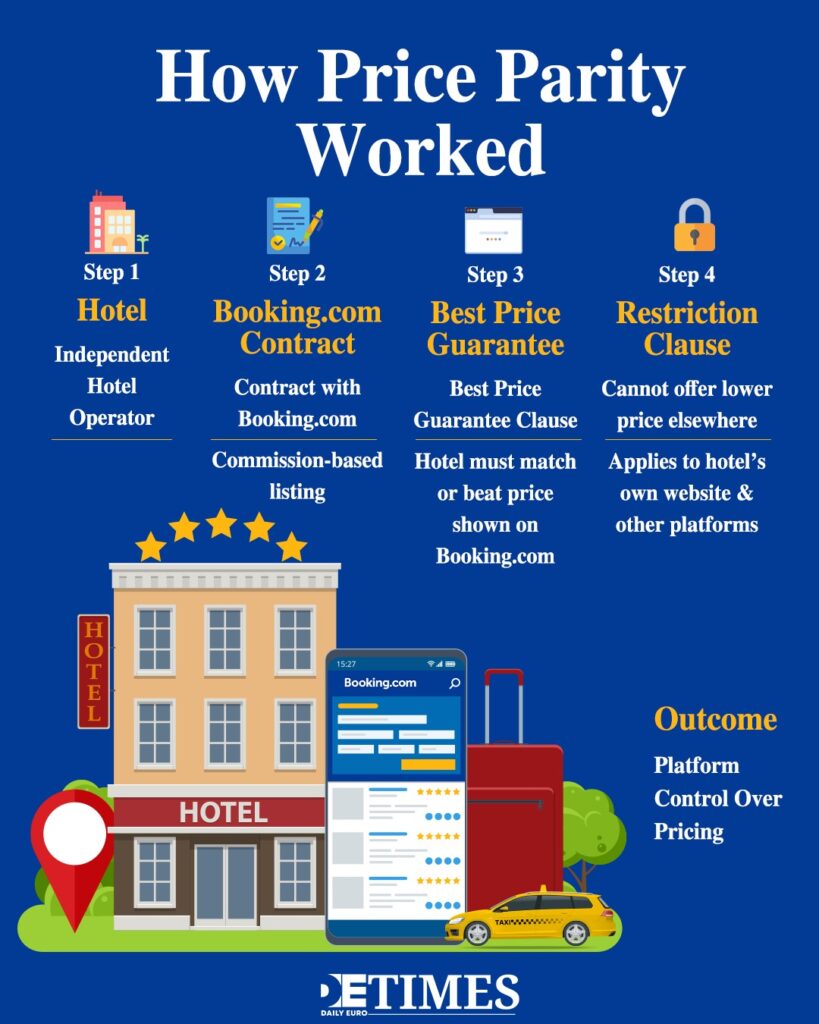More than 10,000 hotels across Europe filed a collective lawsuit against Booking.com this August. The Amsterdam-based platform faces accusations of forcing hotels into harmful pricing agreements from 2004 to 2024.
Hotrec, the umbrella group for European hospitality, coordinates this legal battle alongside 30 national hotel associations.
Platform Power Runs Deep Through Business
Since its founding in 1996, Booking.com has grown into a digital gatekeeper.
The platform’s “best price guarantee” clause prevented hotels from offering lower prices on their own websites or other booking channels. This practice effectively handed pricing control to a single company rather than individual businesses.
European competition authorities have questioned these arrangements for years. In September 2024, an EU court ruling cast doubt on Booking.com’s price parity clauses.
The Helsinki Times reported that growing interest in the lawsuit prompted organisers to extend joining deadlines.

Algorithms Shape Markets Without Oversight
Tech platforms increasingly control how businesses operate and customers shop. Unlike traditional regulators, these companies write their own rules through code and user agreements.
Platform algorithms decide which hotels appear first in search results. They determine commission rates and booking terms.
These systems operate with little external scrutiny. When Instagram filters political content or Apple removes apps from its store, companies exercise power once held by elected officials.
Business Owners Push Back Against Digital Control
European hotels represent thousands of independent operators facing similar struggles. Small businesses across sectors find themselves dependent on platforms that set terms without negotiation.
Restaurant owners rely on delivery apps that charge high commissions. Taxi drivers work through ride-sharing platforms that adjust rates dynamically.
Hotel operators could not simply walk away from Booking.com without losing customers. This dependency allowed the platform to impose conditions that traditional suppliers could never enforce.
Digital Markets Need New Rules
Rather than accepting platform dominance as inevitable, policymakers must establish fairness standards for digital markets. Algorithm transparency laws could prevent hidden manipulation of search results or pricing.
Competition authorities should examine how platforms use data advantages to squeeze suppliers. When companies control both the marketplace and compete within it, conflicts arise naturally.
Europe’s Digital Markets Act provides a starting framework. The law requires large platforms to open their systems to competitors and gives businesses more bargaining power.
Hotel associations across Europe now coordinate legal strategies. Similar lawsuits may emerge in other sectors where platforms exercise comparable control.
The Amsterdam court will determine whether Booking.com owes compensation for years of pricing restrictions. Hotels seek damages that could total millions of euros. More importantly, this case may establish precedents that limit platform power across digital markets.
Keep up with Daily Euro Times for more updates!
Read also:
MENA-Asia Tourism Boom: Europeans Want Sophistication
Tourists Under Fire: Europe’s North-South Economic Divide






